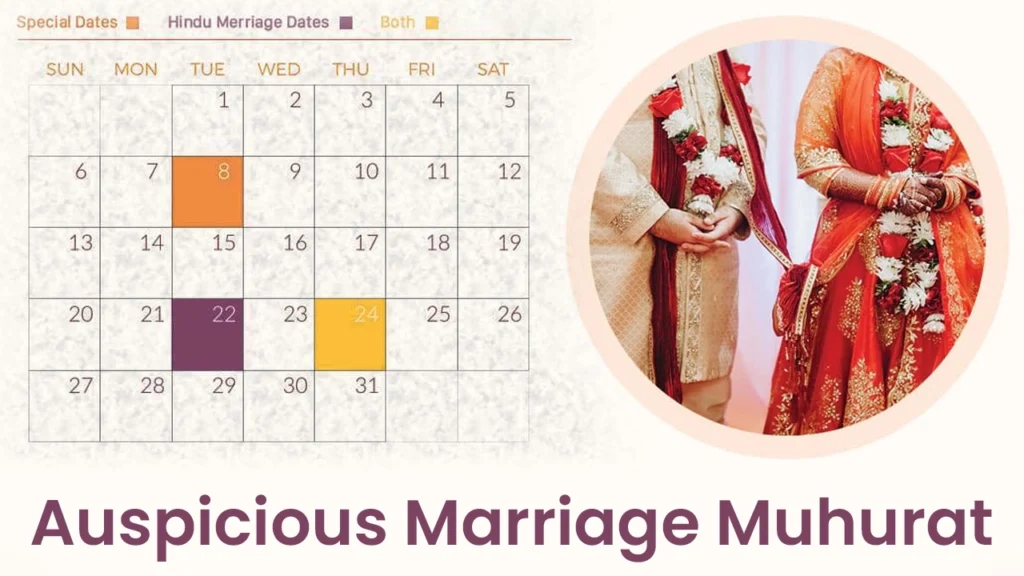Introduction to Auspicious Marriage Muhurat
Finding the perfect life partner is a journey that combines love, compatibility, and understanding. In Vedic astrology, Auspicious Marriage Muhurat Matching (also known as Horoscope Matching or Guna Milan) serves as a guiding tool to assess whether two individuals are truly compatible for marriage. By analyzing planetary positions, Nakshatras (lunar constellations), and Doshas (astrological afflictions), Kundali matching helps determine the potential strengths and challenges of a relationship. If you’re searching for a “perfect match,” this ancient practice might hold the key to unlocking the secrets of a harmonious and fulfilling marriage.
For interesting astrology-related videos, subscribe to us on YouTube
Why Try Kundali Matching for Marriage?
- Ensuring Compatibility :
Every individual has unique traits shaped by the positions of planets at their birth. Kundali matching evaluates these traits to determine how well two people align emotionally, mentally, physically, and spiritually. This ensures a strong foundation for a lasting relationship. - Identifying Potential Challenges :
Certain astrological combinations, such as Mangal Dosha , Nadi Dosha , or Bhakoot Dosha , can lead to misunderstandings, conflicts, or delays in marriage. Identifying these challenges early allows couples to take preventive measures and work on solutions. - Cultural and Spiritual Significance :
Kundali matching is deeply rooted in Indian traditions and is considered a sacred practice. It not only strengthens the bond between the couple but also invokes divine blessings for a prosperous union. - Predicting Long-Term Harmony :
A well-matched Kundali lays the groundwork for a stable and peaceful marriage. It highlights areas of strength, enabling couples to build on their positive attributes while addressing weaknesses.
How Does Kundali Matching Work?
Kundali matching involves comparing the birth charts of the prospective bride and groom based on 36 Gunas (qualities). These qualities are divided into eight categories:
- Varna (Spiritual Compatibility) : Assesses mutual respect and spiritual alignment.
- Vashya (Mutual Attraction) : Determines the level of control and influence each partner has over the other.
- Tara (Destiny) : Evaluates the overall destiny and longevity of the relationship.
- Yoni (Physical Compatibility) : Examines physical attraction and intimacy.
- Graha Maitri (Friendship) : Analyzes emotional bonding and friendship.
- Gana (Temperament) : Checks whether the couple shares similar temperaments (Deva, Manushya, or Rakshasa).
- Bhakoot (Family Welfare) : Focuses on the impact of the Auspicious Marriage Muhurat on family harmony and prosperity.
- Nadi (Health and Progeny) : Examines health compatibility and the likelihood of having children.
Each category carries specific points, with a total maximum score of 36 Gunas . The higher the score, the better the compatibility:
- Above 28 points : Excellent match.
- 20–27 points : Average match; some adjustments required.
- Below 18 points : Poor match; reconsideration advised.
Read Also: Srikalahasti Temple: Famous for Rahu Ketu Pooja
Can Kundali Matching Guarantee a Perfect Match?
While Kundali matching provides valuable insights, it cannot guarantee a “perfect” match on its own. A successful Auspicious Marriage Muhurat depends on several factors beyond astrology, including mutual love, respect, communication, and effort. However, Kundali matching serves as a powerful tool to identify potential areas of conflict and offers remedies to strengthen the relationship. Even if the compatibility score is low, couples can work on building trust and understanding to create a fulfilling partnership.
Key Factors That Influence a Perfect Match
- Mangal Dosha (Mars Affliction) :
Mangal Dosha occurs when Mars is placed in certain houses of the birth chart, potentially causing aggression, disputes, or delays in marriage. If both partners are Manglik, the effects are neutralized. Otherwise, remedies like pujas, fasting, or wearing gemstones (e.g., Red Coral) can mitigate the Dosha. - Nadi Dosha :
Nadi represents the biological constitution of an individual. If both partners have the same Nadi (Adi, Madhya, or Antya), it may lead to health issues or infertility. Performing the Nadi Dosha Shanti Puja can resolve this issue. - Bhakoot and Gana Dosha :
Bhakoot Dosha indicates potential clashes in temperament or family dynamics, while Gana Dosha reflects differences in personality types. Remedies like chanting mantras, observing fasts, or donating to charity can help reduce their effects. - Planetary Positions :
The placement of key planets like Venus (love), Jupiter (wisdom), and Saturn (responsibility) significantly impacts marital success. Favorable placements enhance harmony, while adverse ones may require remedial measures.
Remedies for a Better Match
If the Kundali matching reveals significant Doshas or low compatibility scores, there are several remedies to mitigate their effects:
- Performing Pujas and Rituals :
Specific pujas like Navagraha Puja , Mangal Dosha Puja , or Kalsarpa Yoga Puja can pacify malefic planetary influences. - Wearing Gemstones :
Wearing gemstones recommended by an astrologer (e.g., Ruby for Sun, Emerald for Mercury) can strengthen weak planets and improve compatibility. - Chanting Mantras :
Reciting mantras like the Gayatri Mantra , Hanuman Chalisa , or planet-specific mantras can bring peace and positivity to the relationship. - Fasting and Charity :
Observing fasts on auspicious days (like Tuesdays for Mars) and donating to charity can help reduce the impact of unfavorable planetary positions.
Choosing an Auspicious Marriage Muhurat
Once the Kundali matching is complete, selecting an auspicious date and time (Muhurat ) for the wedding ceremony is crucial. An astrologer analyzes the couple’s charts to identify dates aligned with favorable planetary transits. Starting the Auspicious Marriage Muhurat journey during an auspicious Muhurat ensures blessings for a harmonious and prosperous life together.
Modern Perspective on Kundali Matching
While Kundali matching is deeply rooted in tradition, its relevance in modern times lies in fostering self-awareness and understanding between partners. It encourages open communication about expectations, values, and potential challenges. When combined with mutual respect, effort, and compromise, Kundali matching becomes a powerful tool for building a strong foundation for lifelong happiness.
Read Also: Astrological Aspects in Hindu Astrology Explained
7 Secrets Kundali Matching Can Reveal
- Compatibility Levels : Whether the couple is emotionally, mentally, and physically compatible.
- Potential Challenges : Identifying Doshas like Mangal Dosha, Nadi Dosha, or Bhakoot Dosha.
- Marital Success Factors : Key planets influencing love, trust, and loyalty.
- Auspicious Timing : Choosing the best Muhurat for marriage.
- Remedial Measures : Steps to mitigate negative planetary influences.
- Family Dynamics : How the marriage will impact family harmony.
- Health and Progeny : Insights into health compatibility and the likelihood of having children.
Conclusion of Auspicious Marriage Muhurat
Kundali matching is more than just a traditional ritual—it’s a profound exploration of cosmic influences on human relationships. By analyzing the alignment of planets and Nakshatras, it provides valuable guidance for navigating the complexities of marriage. While astrology offers insights, the ultimate success of a Auspicious Marriage Muhurat depends on mutual love, respect, and effort. When combined with practical wisdom, Kundali matching can pave the way for a lifetime of happiness and fulfillment.
Read Also: Pitta Dosha Symptoms: Balance Your Fiery Energy
7 FAQs on Auspicious Marriage Muhurat
1. What is Kundali Matching, and how does it help find a perfect match?
Kundali Matching, also known as Horoscope Matching or Guna Milan, compares the birth charts of the prospective bride and groom to assess compatibility. It evaluates emotional, mental, physical, and spiritual alignment to predict the success of the marriage. While it doesn’t guarantee a “perfect” match, it identifies strengths and challenges, offering remedies to strengthen the relationship.
2. How does the Guna Milan scoring system work in Kundali Matching?
The Guna Milan system evaluates 36 Gunas (qualities) across eight categories: Varna, Vashya, Tara, Yoni, Graha Maitri, Gana, Bhakoot, and Nadi. Each category carries specific points, with a total maximum score of 36. Compatibility levels are categorized as follows:
- Above 28 points : Excellent match.
- 20–27 points : Average match; some adjustments required.
- Below 18 points : Poor match; reconsideration advised.
However, a low score doesn’t necessarily doom a marriage, as mutual effort and understanding play a crucial role.
3. What are Mangal Dosha and Nadi Dosha, and how do they affect marriage?
- Mangal Dosha : Occurs when Mars is placed in certain houses of the birth chart, potentially causing aggression, disputes, or delays in marriage. A Manglik person is often advised to marry another Manglik or perform remedies like pujas, wearing gemstones, or fasting.
- Nadi Dosha : Occurs when both partners have the same Nadi (Adi, Madhya, or Antya), which may lead to health issues or infertility. Performing the Nadi Dosha Shanti Puja can mitigate its effects.
4. Can a low Guna Milan score still result in a successful marriage?
Yes, a low Guna Milan score doesn’t always mean an unsuccessful marriage. While astrology provides valuable insights, the success of a marriage ultimately depends on mutual love, respect, communication, and effort. Couples with low scores can consult an astrologer for remedies like pujas, mantras, or wearing gemstones to strengthen their bond.
5. Are there remedies if Kundali Matching reveals unfavorable results?
Yes, several remedies can help mitigate unfavorable results:
- Performing specific pujas like Navagraha Puja, Mangal Dosha Puja, or Kalsarpa Yoga Puja.
- Wearing gemstones recommended by an astrologer (e.g., Ruby for Sun, Emerald for Mercury).
- Chanting mantras like Gayatri Mantra or Hanuman Chalisa.
- Observing fasts on auspicious days and donating to charity.
These remedies aim to pacify malefic planetary influences and improve compatibility.
6. Why is choosing an auspicious Muhurat important for marriage?
An auspicious Muhurat (date and time) ensures that the marriage begins under favorable planetary influences, bringing blessings for a harmonious and prosperous life. Astrologers analyze the couple’s charts to identify dates aligned with positive transits, reducing the likelihood of future conflicts and enhancing marital happiness.
7. Is Kundali Matching still relevant in modern times?
Yes, Kundali Matching remains relevant as it fosters self-awareness and understanding between partners. While modern relationships emphasize mutual effort and communication, astrology provides additional insights into personality traits, potential challenges, and areas requiring compromise. When combined with practical wisdom, Kundali Matching serves as a guiding tool for building a strong foundation for lifelong happiness.

